
by Gideon Marcus
I think I've got a bad case of sibling rivalry. When Victoria Silverwolf came onto the Journey, she took on the task of reviewing Fantastic, a magazine that was just pulling itself out of the doldrums. My bailiwick consisted of Analog, Fantasy and Science Fiction, IF, and Galaxy, which constituted The Best that SF had to offer.
Ah for those halcyon days. Now Fantastic is showcasing fabulous Leiber, Moorcock, and Le Guin. Moreover, Vic has added the superlative Worlds of Tomorrow to her beat. What have I got? Analog is drab and dry, Avram Davidson has careened F&SF to the ground, IF is inconsistent, and Galaxy…ah, my poor, once beloved Galaxy…
The Issue at Hand

cover by McKenna
To Build a World, by Poul Anderson
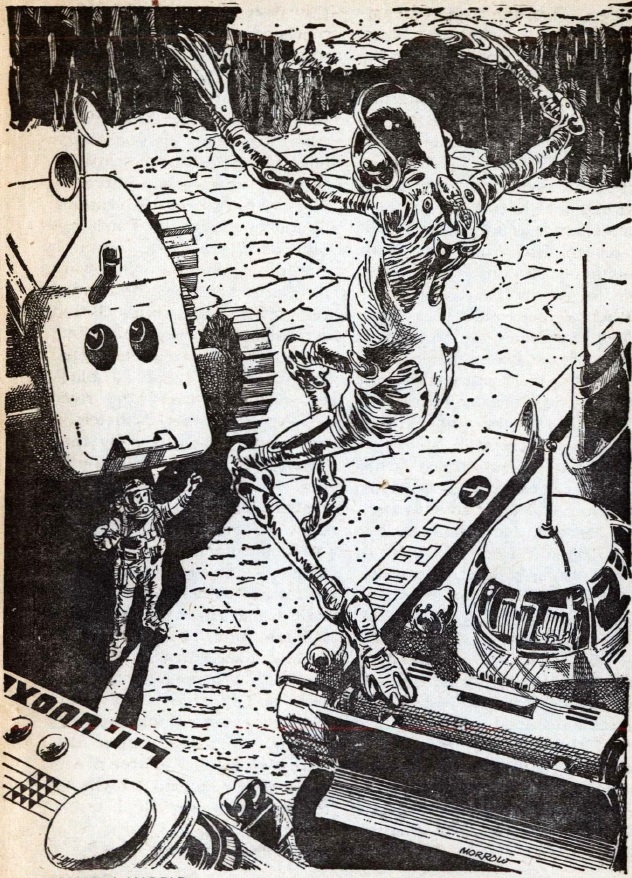
by Morrow
Wham! Kaboom! A giant drilling machine is sabotaged while releasing the gasses pent up under the Moon's surface. A man dies, and the lunar terraforming project is thrown into jeopardy. It is up to the drill team's foreman, Venusian Don Sevigny, to go to Earth and sniff out the plot…before his life is snuffed out!
Sixty pages of stilted exposition punctuated by standard action scenes ensue. Moreover, overcrowded Earth has exactly one woman on it (at least that we ever see), and though she turns out to be a villain, she's far too good-looking to remain one. Sigh.
Poul Anderson vacillates between brilliance and boredom, and To Build a World is a swing of the pendulum hard toward the latter extreme.
Let's hope the thing doesn't get stuck there. Two stars.
The King of the Beasts, by Philip José Farmer
Twenty years ago, this utterly predictable vignette might have made acceptable filler in Astounding. Here and now, it's an embarrassing waste of space.
One star.
The Man from Earth, by Gordon R. Dickson

by Giunta
On the crossroads planet of Duhnbar, the Samarkand of the stars, a visiting human trader fails to observe a minor religious rite. Duhnbar's all-powerful Director decides to make an example of the man, imposing a long-lapsed death penalty. In a futile act of defiance, the man preserves his pride, if not his life.
This is a nicely written piece, and the setup is genuinely interesting, but the ending is a let down. Three stars.
The Well-Trained Heroes, by Arthur Sellings
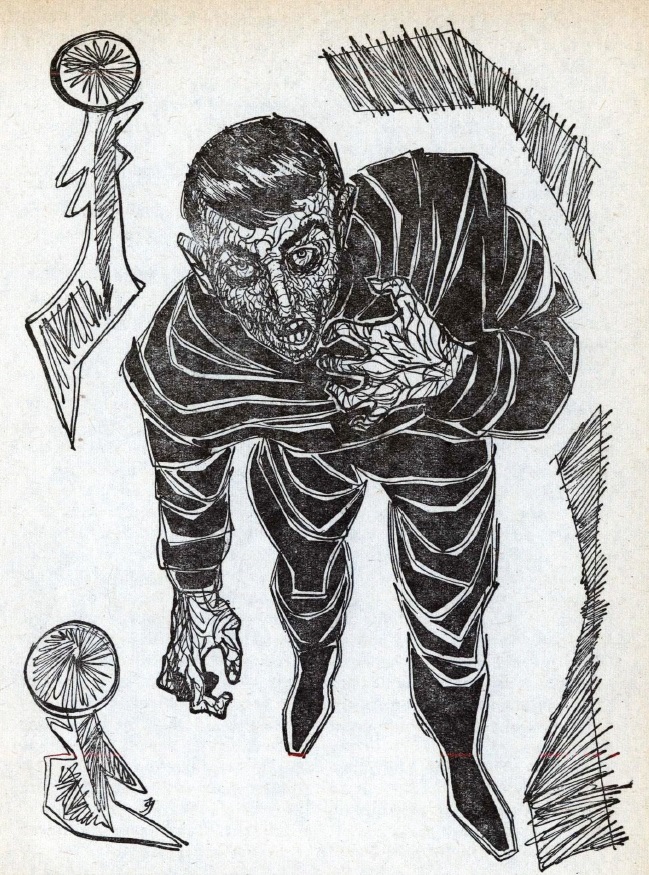
by Jack Gaughan (and not one of his best)
People often have the misapprehension that colonization reduced population pressure. It doesn't; it increases it. Colonies always fill up. Passage is expensive. Inevitably, home remains as crowded as ever, but the folks living there are all the more disgruntled for being stuck there.
In Heroes, Earth's citizens yearn to go to space, but barely one in a million make the cut to join the astronaut corps. Tension builds, and town after town goes into unrest. It is up to a pair of astronauts to defuse would-be rioters by convincing them that space isn't all that it's cracked up to be.
Kind of a neat story, if a little meandering. Three stars.
For Your Information: Anyone Else for Space?, by Willy Ley

After months of desultory articles, Willy Ley is back in form. This month's column is nearly twice as long as it has been recently, and it's chock full of the latest news on rocket development outside the Big Two. Having been to Japan's nascent launch facilities recently, it was exciting to hear about their latest developments (as well as those of the Europeans, the Israelis, the Egyptians, and the Indians!)
Five stars
Collector's Fever, by Roger Zelazny
Rock collecting is a fine hobby, provided the specimens aren't sentient and ready to deeble! A slight, amusing piece that gets extra points for being told almost entirely in dialogue.
Three stars.
The Many Dooms, by Harry Harrison
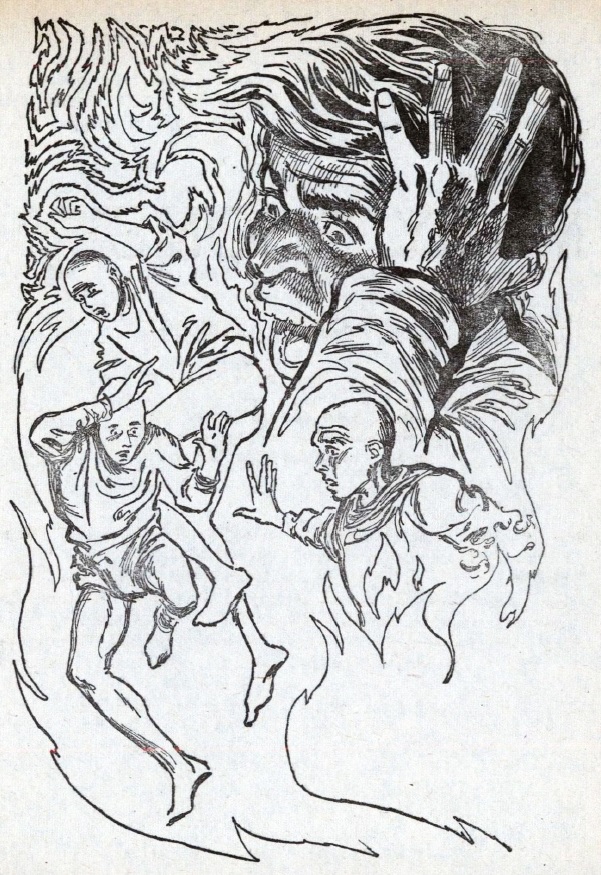
by Nodel
On expeditions to hostile worlds, there is no margin of error. When a cocky geologist's sloppiness threatens the lives of his crew-mates, fate (perhaps with a little push from human hands) deals with the problem.
I liked the writing on this one, and the subject matter is up my alley, but I found the ending both too straightforward and, quite frankly, disturbing.
Three stars.
An Ancient Madness, by Damon Knight

by John Giunta
On an island where breeding is artificial and strictly regimented, and romantic pairings are unheard of, one sixteen year old girl longs for a dramatic love.
A lot. Loudly and repeatedly. For twenty angst-infused, plot-stationary pages. Then, in the final two paragraphs, she runs off with the Doctor to live happily ever after.
I'm not sure why this story was written. I'm even less certain how I made it through the thing.
Two stars.
Men of Good Will, by Ben Bova and Myron R. Lewis
In the near future, the Cold War has spread to near-Earth space, occasionally sparking into moments of heat. For some reason, however, the Moon seems to be a zone of armistice. The Norwegian UN ambassador heads to the Earth's companion to find out the secret.
The secret (read no further if you wish to remain unspoilt): The Yanks and the Ruskies did shoot it out — once. Those bullets achieved orbital velocity, and every 27 days, their orbit intersects with the bases, peppering them with new holes. It's simply too dangerous to keep up the fight.
It's a cute premise, but of course, it makes absolutely no sense. The periapsis of the bullets only intersects with the bases once out of 24 x 27 orbits; the rest of the time, the bullets should be hitting lunar hills. They should have been stopped after the first grounding.
C'mon, Ben! You're a science writer fer cryin' out loud. Two stars.
The Sincerest Form, by J. W. Groves
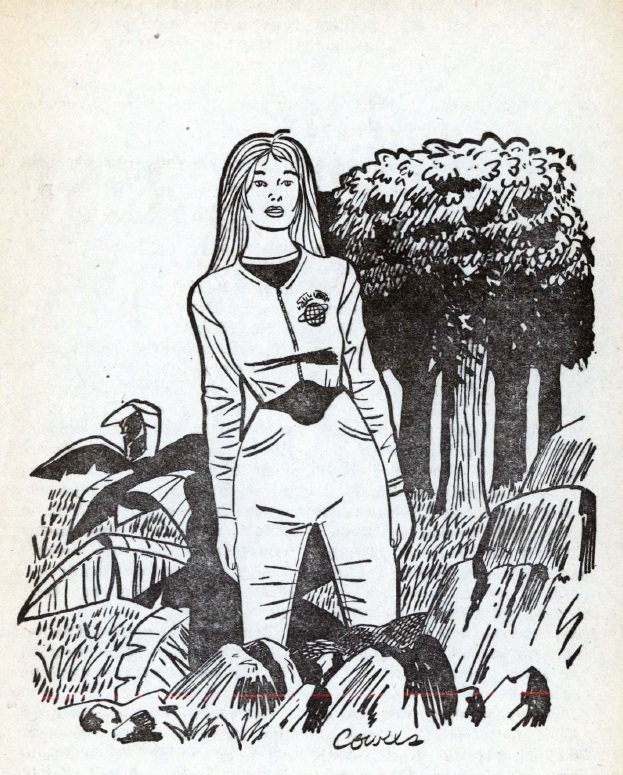
by Cowles
Last up, we have a tale told from the point of view of imitative aliens, spore-like things that have no consciousnesses of their own, but which can become replicas of the beings they devour. The process is imperfect, and the thought processes get a bit garbled. In fact, it takes a while for the reader to figure out what's going on; it is only when the imitators encounter bonafide humans that things become clear.
I have to give Groves credit for an interesting concept, but the very trickiness of the idea meant that proper execution lay slightly beyond the author's ability. Still, if he doesn't quite stick the landing, Groves does leave you with something to think about.
Three stars.
Summing Up
So, on the one hand, I am left grousing at my fate, stuck with a 2.7 star issue while Vic reviews the good stuff. On the other hand, I'm not John Boston, resigned to review bottom-of-the-pack Amazing every month. Plus, is that a new issue of Gamma I see peeking out from under the stack of bills?
I suppose I do have blessings to count!
[Come join us at Portal 55, Galactic Journey's real-time lounge! Talk about your favorite SFF, chat with the Traveler and co., relax, sit a spell…]


 Red Guard rebels march in Shanghai last year.
Red Guard rebels march in Shanghai last year. Those are supposed to be radiators, not rocket thrusters. Art by McKenna
Those are supposed to be radiators, not rocket thrusters. Art by McKenna
![[August 2, 1968] Dreams and Nightmares (September 1968 <i>IF</i>)](https://galacticjourney.org/wp-content/uploads/2023/07/IF-1968-09-Cover-672x372.jpg)
![[February 4, 1967] The Sweet (?) New Style (March 1967 <i>IF</i>)](https://galacticjourney.org/wp-content/uploads/2022/01/IF-Cover-1967-02-full-672x372.jpg)



![[May 2, 1966] By Any Other Name (June 1966 <i>IF</i>)](https://galacticjourney.org/wp-content/uploads/2021/04/IF-1966-06-Cover-650x372.jpg)

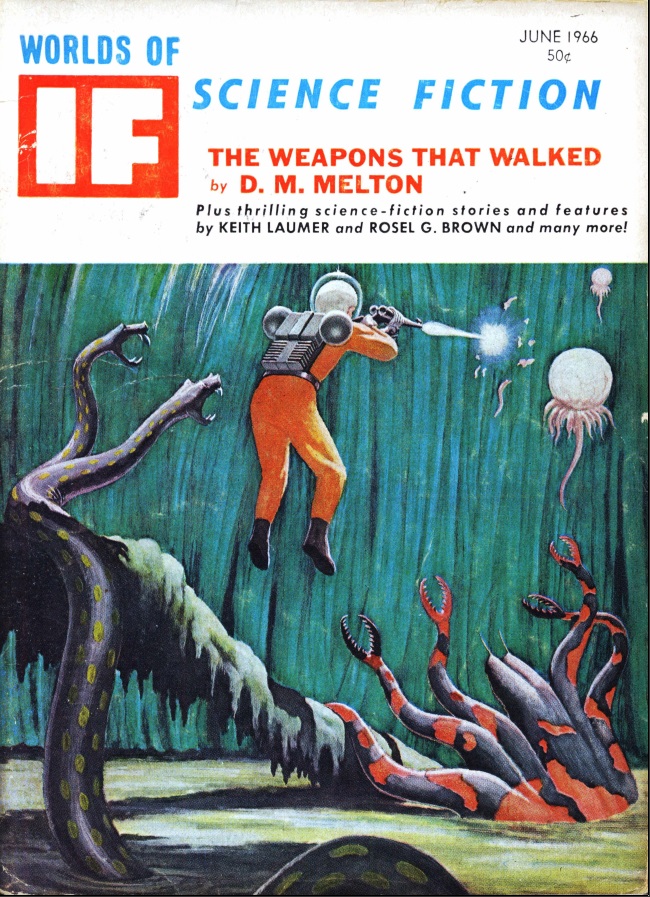
![[August 2, 1965] Expansion and Contraction (September 1965 <i>IF</i>)](https://galacticjourney.org/wp-content/uploads/2020/07/IF-1965-09-Cover-654x372.jpg)





![[June 2, 1965] Heck in a Handbasket (July 1965 <i>IF</i>)](https://galacticjourney.org/wp-content/uploads/2020/05/1965-07-IF-cover-653x372.jpg)



![[March 4, 1965] OLD WINE IN NEW BOTTLES (April 1965 <i>IF</i>)](https://galacticjourney.org/wp-content/uploads/2020/03/IF-march-cover-655x372.jpg)


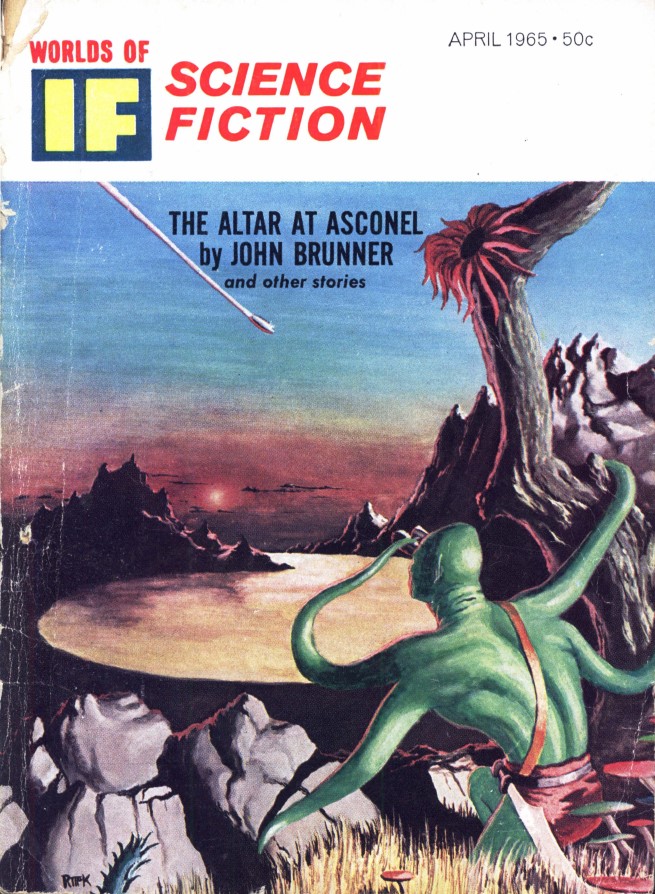
![[February 6, 1965] Too much of a… thing (March 1965 <i>IF</i>)](https://galacticjourney.org/wp-content/uploads/2020/02/650204cover-672x372.jpg)









![[January 26, 1965] Down the Rabbit Hole…Again (February 1965 <i>IF</i>)](https://galacticjourney.org/wp-content/uploads/2020/01/650126cover-672x372.jpg)










![[May 8, 1964] Rough Patch (June 1964 <i>Galaxy</i>)](https://galacticjourney.org/wp-content/uploads/2019/05/640508cover-672x372.jpg)








![[February 9, 1964] Bargain Basement (March 1964 <i>IF</i>)](https://galacticjourney.org/wp-content/uploads/2019/02/640209cover-672x372.jpg)





